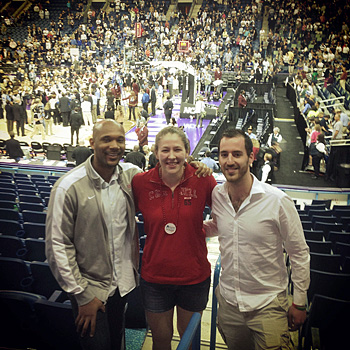Coaching career beckons Big Red women's basketball star

Clare Fitzpatrick '13, center, at the Women's Basketball Coaches' Association "So You Want To Be A Coach" program in New Orleans in early April with Cornell assistant coaches Kharmen Wingard, left, and Daan de Heus, right.
When Clare Fitzpatrick '13 recently decided that she wanted to go into the coaching profession, she didn't have far to look for guidance. She went where she has gone many times before -- the office of Dayna Smith, the Rebecca Quinn Morgan '60 Head Coach of Cornell Women's Basketball.
Fitzpatrick, a four-year letter winner playing forward for the Big Red, started a school-record 109 games during her career on East Hill. She leaves Cornell ranked seventh in Big Red history in points (1,201) and sixth in rebounds (609). One of the team's leading scorers in each of her four seasons, she is the fourth player in Cornell history, and the first ever under Smith, to reach 1,200 career points and 600 career rebounds.
But she needed to figure out how to translate her on-court success to a career on the sidelines.
"Coach Smith suggested that I start working camps, and she recommended that I apply for the WBCA's [Women's Basketball Coaches' Association] 'So You Want To Be A Coach' program," says Fitzpatrick. "It was a tough application process and they had a record number of people apply, so I feel really fortunate to have been chosen."
The 11th annual "So" program was held April 5-7 in conjunction with the WBCA National Convention and the NCAA Women's Basketball Final Four in New Orleans. Fitzpatrick was one of 50 senior women's basketball players from around the nation selected based on academics, contributions to women's basketball (on and off the court), résumé and a written recommendation from their head coach.
Among the objectives of the "So" program are to increase the understanding of skills necessary for coaching success, while introducing female basketball players to coaches and administrators. The program featured talks from many current head and assistant college coaches, and the participants had access to a wide range of clinics and workshops.
Fitzpatrick says it was fascinating hearing the different coaches' perspectives: "They all had different lessons to teach us. But one thing I came away with was that when you go from being a player to a coach, it becomes all about providing for the team.
"They really echoed why I want to get into coaching. It's about creating connections deeper than 'X's and 'O's. You can influence young women's lives and help them to grow during their college years."
Since returning to Ithaca, Fitzpatrick has begun applying for jobs, and while she would like to stay in the Northeast, close to Cornell and her hometown of Southbury, Conn., she realizes that may not be possible.
"Something I learned from the weekend is that you need to start from the bottom and you need to be willing to go anywhere and do anything, and if you aren't willing to do that then coaching isn't the profession for you," she says. "I applied to a lot of jobs around here, but really, I'm willing to go anywhere."
"Ultimately, I'd like to be a head coach at a Division I school," she continues. "And I'd love to stay in the Ivy League or in the Patriot League, and work with a program that's high-academic and high-basketball. I think having high academic opportunities is crucial for young women to grow and have success."